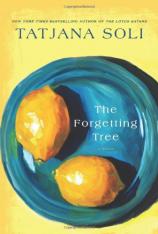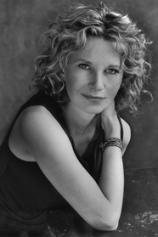Author Essay: An Original “Behind-the-Scenes” Essay by the Author (Sept '13)
“Claire would be loyal to that mystery to the end of her days, because it was identical to the mystery of life, which one loved without ever fully comprehending it.”
Our first house in Southern California was on top of a hill with a view below of orange and avocado groves stretching out in rows as far as the eye could see. In the spring, the air was perfumed with citrus blossoms, and at roadside stands you could pick up large bags of oranges and lemons for a dollar. I loved it and took it for granted that it would always be that way.

Tatjana visiting an organic citrus
orchard in Pauma Valley, North San Diego County.
A few years later, on our evening hike through eucalyptus groves, we came across a fleet of parked tractors. Plans were under way to tear down trees to make a road. Five years later there was a four-lane highway where the grove had been; five years after that, there were gated housing developments as far as the eye could see. Now the only smell of orange blossoms comes from our potted trees in the garden. It was my first experience of the transience of place. Although I disliked what was happening, I was relatively a newcomer. I wondered how the people who had lived here for generations, who had made their living from farming, felt about the changes. Most of my ideas for books start with place, but this one also started with a character, Claire, a ranching woman, who would not accept the transience of place.
Place was also integral in connection to another of the major issues I wanted to explore in the book — the clash of different cultures. I wanted to explore the issues of power/powerlessness and needed a catalyst. One of my favorite novels is Wide Sargasso Sea by Jean Rhys. In college I remember my writing professor recommending it to me, saying, “It will change you.” That’s a pretty irresistible recommendation, isn’t it? One of the overwhelming things in the book for an English major is the discovery that the madwoman in the attic from Jane Eyre is actually a living, breathing human being with her own side of the story to tell. It makes it very hard to ever return to Jane Eyre and see that story in the same light. The idea of a character others make false assumptions about intrigued me and became the seed for the character of Minna. She allowed me to explore questions such as, When do we finally belong to a culture, to a family? Do we have to forget our past selves? When can we finally call a place home?








